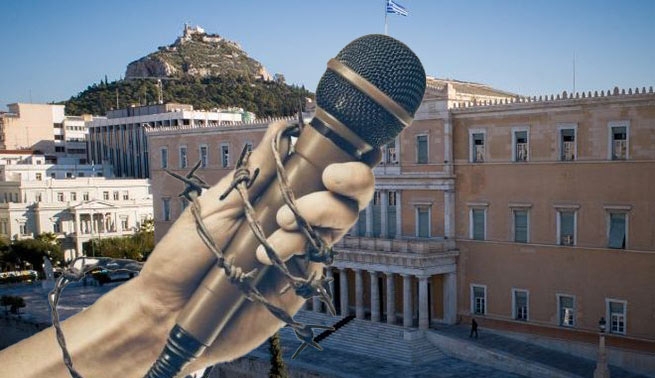With the votes of the New Democracy, the bill “Increasing Publicity and Transparency in the Print and Electronic Press” was approved in the plenary session of the Greek Parliament, while the opposition parties voted against.
The bill provides for the creation of a special committee that will judge the observance or non-observance of the principles of journalistic ethics and conduct. Among the conditions set by the draft law for the registration of an enterprise in the Register of Electronic Press is that the enterprise “should not contain material that is a reproduction of content posted or published on another site, without the written consent of the latter, or in the publication of another publisher.”
To register in the register, a number of conditions must be met, including the mandatory employment of a minimum number of journalists and other employees of various specialties and categories under an employment contract.
We passed the law because we are criticized…
“Recently, we have been experiencing an unprecedented and coordinated attack on the government, and through it, on our country, using as a means of assessing the level of freedom of the press in Greece by some organizations. It is remarkable, even surreal, that these views are expressed with great zeal here in Greece , the media that criticizes the most,” said government spokesman Giannis Ikonomou.
“Some, with their sick imaginations, have begun to argue that Greece lags even behind dictatorships in terms of press freedom,” the deputy minister told the prime minister, pointing to “Reporters Without Borders’s” infamous report on press freedom in Greece.
“Aside from Greece, this report says Trinidad ranks ahead of France in terms of press freedom. Burkina Faso, where street shootings take place, ranks ahead of US press freedom. The Dominican Republic ranks above Spain and Australia. Namibia and East Timor, they say” Reporters Without Borders “ranks above Belgium and the UK,” he said, echoing his well-known snub of the international press organization, among other things.
It is worth noting that the law was approved only by the votes of the New Democracy party. At the same time, not only the opposition, but also the scientific council of the parliament opposed the law, which in its report states that “in the light of the powers of the committee, its composition may cause concern, given that it requires the selection of persons with guarantees of impartial and objective judgment and lack of qualities, that could lead to a conflict of interest.” In addition, he notes that “the procedure applied in this regard needs to be clarified in the spirit of the provisions of article 14 of the constitution”, i.e. articles guaranteeing freedom of the press.
Opposition reaction
The opposition vehemently opposed the bill, citing a report by Reporters Without Borders that ranked Greece 108th in terms of freedom of the press, and stating that Greece would turn into a totalitarian state after the law was passed.Editors’ Newspaper.
“Mr. Iconomou, you were talking about the 108th place in the rating on July 7, 2022. Do you know who RSF met? The meetings themselves testify to the consistency of their ratings. They met with the President of the European Parliament, Ms. Metsola. And you come here and trying to defame them?” said SYRIZA representative in parliament Yannis Ragusis, addressing a government representative.
The government spokesman also tried to reassure the targeting of the bill, saying: “We do not seek any interference in the person, in the essence, in the direction that the newsletter, the information site wants to have. This is the choice of journalists, this is the choice of the owner.”
Giannis Ikonomou argued that the bill establishes uniform rules in the distribution of public advertising and access to financial assistance programs. “This will ensure independence, transparency, sustainable entrepreneurship and healthy media competition,” Iconomou said. In response, opposition representatives pointed out that only those media outlets that pursue an editorial policy loyal to the government and do not criticize the authorities for their mistakes receive state advertising and support. This effectively turns them into the pocket media of the New Democracy.
Speaker from SYRIZA Anastasia Gara said that today they should discuss the draft law on protecting the independence of the press and its viability. “A shameful 108 position on the state of press freedom in Greece will stigmatize this government,” said Ms Gara, who denounced the logic of “targeting and harassing” and “surveilling” journalists. “With these undemocratic actions, you are belittling the country and the rule of law,” she said, adding that the bill, in fact, does not solve any of the problems of the print and electronic press and certainly does not serve transparency, but tries to entertain with impressions in connection with the recommendations of the European commissions. Ms. Gara referred to article 32 of the draft law, saying that it brings new reductions in the number of employees of TV channels, leads to further flexibility and intensification of labor relations. The MP called “photographic” the provision on granting a new extension for broadcasting in high-definition format and the provision on postponing the tender procedure for licensing thematic media. Unlike Mr. Khionidis, she emphasized that it would be the minister who would intervene in the composition of the ad hoc committee on the observance of the principles of journalistic ethics and conduct.
Special Rapporteur PASOK Harris Castanidis noted that the bill is characterized by “a number of problematic provisions.” Among them, he noted the provision that persons holding less than 10% of the shares are not required to provide a criminal record confirming that they have not been convicted of a number of crimes, such as fraud. The PASOK Special Rapporteur also stated that a listed company is not required to declare its share of shares as long as the individual owns the share. As for the distribution of state resources, the deputy stressed that a bipartisan agreement is needed on the rules that should regulate their distribution, especially after the experience of the “Petsas list”. Speaking about the requirements for the minimum number of employees in the media, he noted that there should be a clear obligation to work full time. In particular, with regard to article 32 of the draft law on TV employees, he said that up to 25% of employees may not be journalists or employees of the provider, but personnel provided by media-related companies.
“This automatically means that the number of journalists and other employees is reduced to please third parties,” he said.
According to a speaker from KKE Manolis Sintifakis, the bill is aimed at “strengthening control and influence of the state in the press, and media workers will become its victims.” “Talking about objectivity, pluralism and ethics is just shaking the air,” the deputy said, referring to the position of the majority of the media, whose goal is to promote the interests of their large owners and convince them of the unpopularity of the government’s policies of the day. Regarding the link between registries and the distribution of public resources, he denounced the fact that they become a tool of pressure, especially for small media, and are a fig leaf after the hype around the “Petsas list”. The speaker from the KKE warned that the Commission for the Compliance with Journalistic Ethics and Ethics is a state commission for the control and judging of information, comments on articles, political positions of the media. He also called the provisions on the minimum number of employees unacceptable because they encourage layoffs. In particular, regarding the minimum number of employees at TV stations, Mr. Sidiyakis noted that this further increases the percentage of employees from affiliated companies. “This percentage increases from 15% to 25%, which means layoffs, unemployment, intensification of labor, an increase in daily working hours, and therefore unpaid working hours, and therefore a decrease in wages, since both labor relations and wages in affiliated companies form the conditions of the galley,” the KKE Special Rapporteur stressed.
Speaker from MP25 Sophia Sakorafa noted that when people hear about “transparency” in the press, their thoughts return to the “Petsas lists”, i.e. “the people have the opposite, and the government has a hidden pride.” Sakorafa stressed that the country’s place in the 108 press freedom rankings has also become the “political identity” of the Mitsotakis government. “The executive branch has included the media in the network of interconnection, using selective financing as a tool,” she said, noting that today there are a few exceptions when the media did not succumb. For government advertising, acceptable positioning is a process that is transparent in all its stages, from planning to distribution of government advertising, according to the purchaser of the MP25. She stressed that the bill deviates from this basic principle. The MP25 MP warned of a new deterioration in labor relations in the press sector and new layoffs. Like other opposition speakers, Sakorafa called scandalous a provision that stipulates that time and space for advertising can be contributed as capital in companies of any form. As for the Commission on the Compliance with Journalistic Ethics and Conduct, according to the deputy, there is a serious problem with its composition, which is expected to be chaired by a representative of the Boci Foundation.
Hellenic Solution speaker Konstantinos Hytas denounced the government’s “hidden ties to the channel owners” and wondered how the ND government could talk about pluralism, transparency, publicity and accountability when no party elected by the Greek people has ever been featured on Greek TV channels, with the exception of ERT and several local channels. “In which country in Europe has a political leader not spoken on the so-called mainstream channels?” asked Hitas. “You, as a government, control everything. Any government does that. But yours has no precedent,” said Mr. Hytas, noting that today all radio stations broadcast “hymns” to Kyriakos Mitsotakis in a general atmosphere supported by the media that “everyone worth nothing but Mr. Mitsotakis” and that “Moses distributes money”.







More Stories
The Greek Parliament lifted parliamentary immunity from K. Velopoulos – he will be tried in an ordinary court
“Spartans”: there is one less parliamentary party in the European elections because… “they like it that way”
Greek diplomats defending LGBT rights